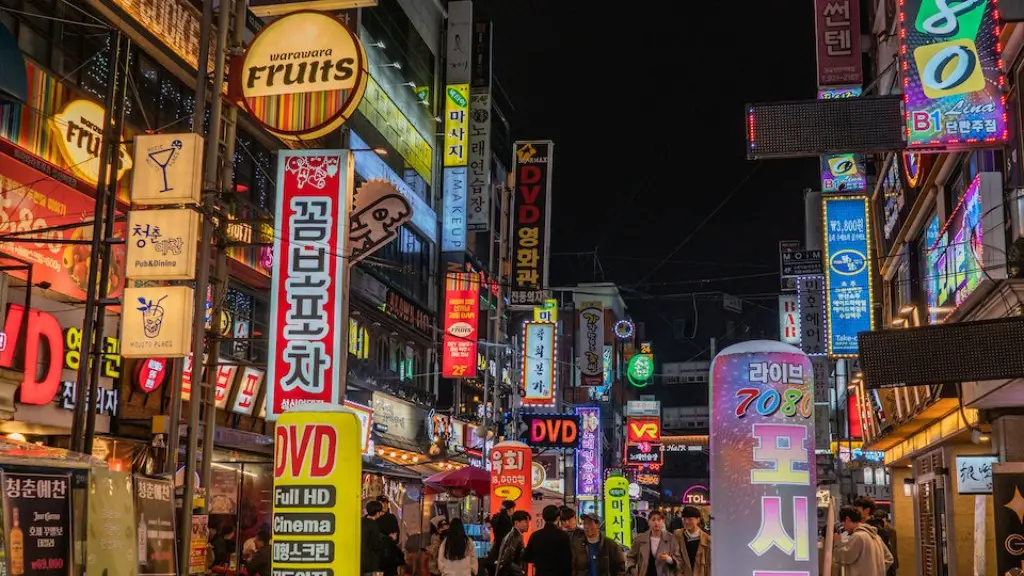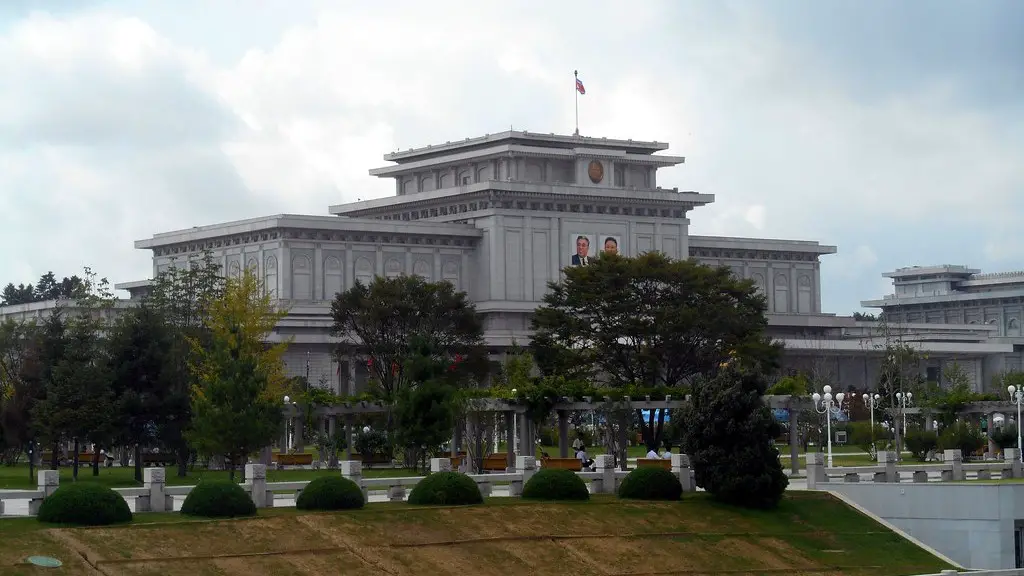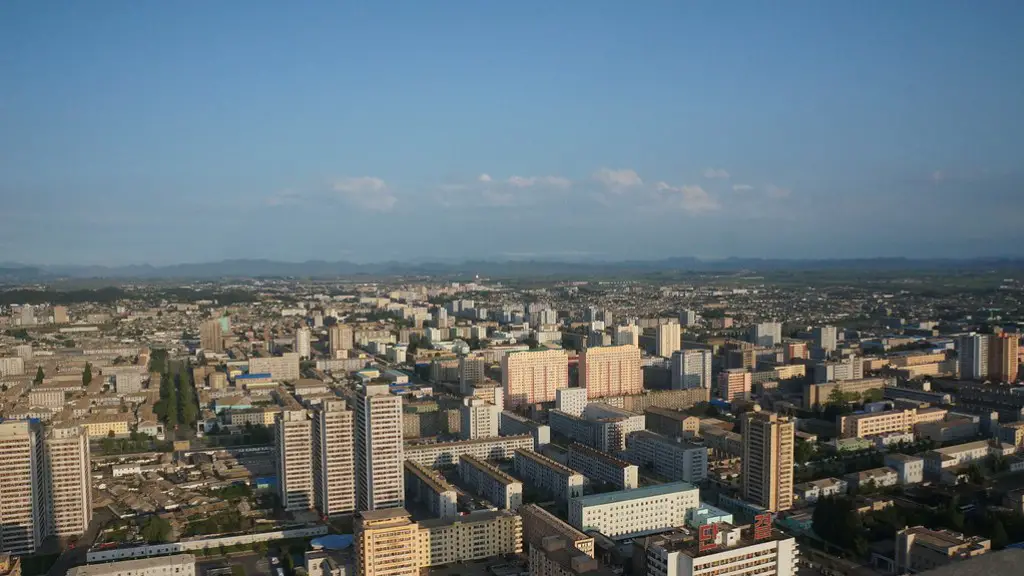Deterring North Korea’s Nuclear Ambitions
The prospect of North Korea possessing nuclear weapons is something that has troubled the international community for decades. The secretive state has sought to expand its capabilities, despite numerous sanctions and attempts from world powers to stop it. This has caused tension and unease in the region, with many wondering how best to curb the rogue state’s nuclear ambitions. In this article, we will explore the various ways in which North Korea’s nuclear arsenal can be prevented from growing, as well as examine the consequences of failure to do so.
In 2020, the international community imposed sanctions on any North Korean individuals and entities that support the country’s nuclear program. This, coupled with the implementation of a regional arms embargo, has had a noticeable dent in the rogue nation’s attempts to expand its capabilities. Even so, North Korea has continued to resist any attempts by the international community to curb its weapons programs, urging other countries to “stop interfering” and accusing them of “imposing their will” onto the country.
However, experts believe that the most effective way to stop North Korea’s advancement of its nuclear weapons program is to focus on the country’s political and economic motivations. This would require the US, China, Russia and other regional powers to come together and form a consensus on how best to address the issue. These could include trade sanctions, altering diplomatic ties, as well as providing economic and military incentives to North Korea in exchange for them freezing their nuclear program.
Despairingly, the prospects of such a plan seem remote. North Korea has been historically hostile toward the international community and has outright refused to cooperate. This has resulted in a cycle of tensions, with the nation continuing to advance its nuclear capabilities despite the best efforts of other countries to set it on a different path.
However, some experts believe that there is still hope in addressing the issue at hand. Proponents of a policy of “strategic patience” argue that the best way to go about it is to wait for the regime to collapse and see the people rise up against them. This would ultimately put an end to North Korea’s nuclear ambitions. However, many point out that such an idea is highly optimistic and may be too risky to pursue in its current form.
When it comes to stopping North Korea from further developing its nuclear capabilities, it has become clear that there are no easy answers. Any potential solution requires a multifocal approach, with all countries involved in the dispute playing their part in maintaining peace in the region. Until then, the most we can do is continue to put pressure on North Korea’s secretive regime and hope to bring them back onto the path of cooperation.
Beauty in Sanctions
In light of the above, it can be seen that one of the most effective forms of diplomacy towards North Korea is the implementation of sanctions. Such a policy serves several purposes: It provides an incentive for North Korea to cooperate by diverting resources to other areas, and it could gradualy wear down the nation’s resolve to continue its nuclear ambitions.
Another benefit of sanctions is that it would stop any third parties from aiding North Korea in its nuclear pursuits. It would be almost impossible for the nation to bypass or ignore such restrictions, due to the nature of the international economic system. This means that any attempts to obtain nuclear material or technology from the outside world would be futile, and could be easily countered by the international community.
At the same time, sanctions can be seen as a form of ‘soft power’; they offer a middle ground between more aggressive forms of diplomatic coercion, such as military force, and diplomatic engagement. This has been beneficial in North Korea in the past, as it allowed non-confrontational dialogue and dialogue-focused solutions to be explored between world powers and North Korea.
Sanctions have also had a positive effect on the regional balance of power in recent years, as they have put a strain on North Korea’s economy and reduced the amount of resources available to the country. This has made it increasingly difficult for the nation to make progress on its nuclear weapons programs, and has been beneficial in keeping the rest of the region safe.
Ultimately, the implementation of sanctions can act as a powerful tool for preventing further nuclear weapons development in North Korea. It is a viable option for the international community and is the most practical way to bring about long-term change in the region.
Engagement through Diplomacy
Another way in which to address North Korea’s nuclear ambitions would be through diplomacy. This is, arguably, the most humane way of dealing with the issue and is a viable alternative to more aggressive forms of influence such as military force. Diplomacy provides an opportunity for dialogue and negotiation between all parties involved in the dispute – something that has been absent in recent years.
The basis of any diplomatic solution should be to offer incentives to North Korea in return for cooperation. This could include tangible rewards such as economic aid, technology, trade and even membership to the United Nations in exchange for their abandoning their weapons program. This could prove to be a beneficial and less risky strategy than if the US, China and other powers were to employ military intervention.
At the same time, it is also worth considering that any diplomatic approach must begin with an assessment of North Korea’s aims and interests. There is no single universal solution to the problem; rather, an in-depth and detailed analysis of the specific situation is necessary in order to figure out what type of incentives would be most effective and likely to convince North Korea to cooperate with the international community.
Futhermore, in order for any diplomatic solution to work, North Korea must feel as if they are being heard and respected. This means that international powers must be willing to compromise and adjust their own demands accordingly. This, coupled with assurances of security and stability for North Korea, could be an effective way of encouraging the rogue state to cooperate.
Countering North Korea’s Nuclear Role Model
It should also be noted that North Korea’s pursuit of nuclear weapons is partially motivated by the example set by other countries in the region. For example, countries such as Russia and China have long possessed nuclear capabilities and have been unwilling to abandon them entirely. This has encouraged North Korea to continue building and expanding its own nuclear program, as it demonstrates that doing so can bring security and geopolitical influence.
However, it is worth bearing in mind that North Korea’s motivations are unique, and solutions need to take this into account. This may include reassuring North Korea that they will not be attacked by their neighbors, as well as offering incentives for disarmament and offering security guarantees. A credible solution must address North Korea’s fears and ensure its sovereignty is respected.
Additionally, other countries in the region should also consider reducing their own nuclear arsenals in order to set a positive example. This could include scaling back on nuclear research and development, as well as reducing the number of weapons on alert.
Removing nuclear weapons from the region entirely would be beneficial for all sides, as it would allow for the renegotiation of arms control treaties and offer renewed confidence that the region is free from nuclear threats. However, this would require a coordinated effort across all countries in the region, and agreement from North Korea itself.
Political Commitments and Diplomatic Pushing
Ultimately, any successful attempt to reduce North Korea’s nuclear program would require strong political commitment from all sides. This would need to be backed up by diplomatic engagement, as well as a thorough understanding of the nation’s motivations and aims. This could prove difficult given North Korea’s lack of transparency and tendency to brush off attempts to prohibit nuclear proliferation.
The UN Security Council could also play a role in any attempt to slow down North Korea’s nuclear program. Countries could be asked to support its efforts by introducing sanctions and other measures. Additionally, the council could provide a platform for dialogue and negotiations, allowing for a more constructive approach in addressing the issue.
Finally, the international community should continue to push for North Korea to accept inspections of its nuclear facilities. This would allow for a more thorough understanding of the nation’s nuclear capabilities, and it could lead to a better level of trust between North Korea and the rest of the world.
When it comes to stopping North Korea’s nuclear ambitions, it is clear that there is no ‘one size fits all’ solution. It requires careful consideration, an understanding of motivations and a well-thought-out strategy to ensure that peace is maintained in the region. The rest of the world cannot continue to stand by and watch as North Korea advances its nuclear program; it is up to us to find a way to bring about change.
The Benefits of Engaging China
When addressing the challenges of North Korea’s nuclear program, some countries have looked to China for help. This is understandable given the nation’s close ties to North Korea, as well as its considerable economic and political influence in the region. However, it should also be noted that China’s involvement in the dispute should be limited, as too much pressure could have a destabilizing effect on the region.
That said, China has is still in a unique position to influence North Korea. As the closest neighbor of the secretive state, it has access to information and resources that are not available to the rest of the international community. Additionally, the nation is also more likely to have more success when it comes to convincing North Korea to cooperate.
China should also be engaged in developing a longer-term regional security framework. This could include regional security dialogues, assurance that regional borders are respected, and further regional economic and political cooperation. All of these efforts should be conducted with an overriding emphasis of peace and respect for human rights.
In conclusion, it is clear that the numerous and complex challenges that stand before the international community in regard to curbing North Korea’s nuclear ambitions. There is no single solution to the issue, and any attempt to solve it must take into account the unique motivations and politics of the region. That said, by combining diplomacy, sanctions, and strategic patience, the international community may have the best chance of finding a satisfactory solution to the crisis.





